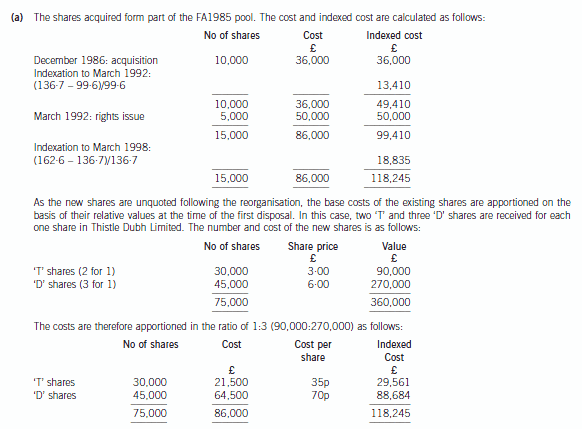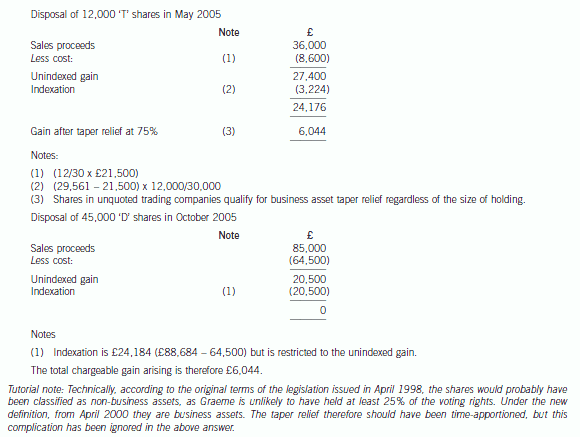重庆市2019年12月ACCA考试成绩公布时间定了!
发布时间:2020-01-10
2019年ACCA最后一次考试(12月考季)已然落下帷幕,很多同学都在关注着自己的考试结果。据悉,ACCA官方将于2020年1月13日(明天)公布本次考试成绩。届时,大家可以在第一时间查询到自己的成绩。下面的ACCA成绩查询方法及流程希望对你有所帮助。
ACCA考试成绩查询方法
1.电子邮件(e-mail)
您可以在 MY ACCA 内选择通过 E-mail 接收考试成绩。
2.短信接收(SMS)
您可以在 MY ACCA 内选择通过 SMS 接收考试成绩。
3.在线查看考试成绩
所有在ACCA全球网站上登记的考生都可以在线查看自己的考试成绩。
在线查询成绩具体操作流程指导
(1)进入ACCA官网点击右上角My ACCA进行登录;

(2)输入账号、密码登录后进入主页面,点击 Exam status & Results;

(3)跳转页面后选择View your status report;

以上就是关于ACCA成绩查询的相关信息,51题库考试学习网在这里祝大家欧皇附体,成功通过考试!
下面小编为大家准备了 ACCA考试 的相关考题,供大家学习参考。
(b) Assuming that the acquisition proceeds, what steps will Datum Paper Products need to take to build a shared
culture in the two companies? (10 marks)
(b) Developing a shared culture will be one of the key determinants of whether the anticipated benefits of the acquisition actually
materialise. Due diligence procedures before the merger should have established the key people issues. This will include
reviewing the two management styles and cultures. Clearly these are very different, looking at internal communication pre
and post acquisition, understanding the nature of reward systems in the firm to be acquired, assessing the nature of training
programmes in the firm both before and after the acquisition and attempting to gauge existing employee attitudes towards
Papier Presse and the likely reaction to the acquisition. Reviewing areas where there have been significant staff problems and
consequent negotiations will also be an important clue as to employee attitudes and morale. ‘Hard’ people issues including
pensions, management rewards, health insurance and redundancy terms will need to be realistically assessed and the
implications for both the price paid for the company and subsequent integration fully understood. All too often the compelling
strategic vision for the enlarged company ignores the people costs involved and the time needed to develop shared HR
systems.
Many models on culture and culture management could help to achieve a successful transition. Mintzberg’s cultural or
organisational configuration model, which would facilitate an understanding of the difference in structures and systems, could
be a useful starting point. DPP comes from a divisionalised company where the middle line managers are given considerable
autonomy in achieving agreed levels of performance. Papier Presse, with its dominance by family ownership and
management, could be argued to be entrepreneurial in character, where the owner/managers at the strategic apex of the
company operate a ‘hands-on’ approach and direct control of subordinates. Reconciling these different cultures and structures
will not be an easy task.
Lewin’s 3-step model of change can be used in helping a positive culture emerge from the combining of the two companies.
There is a need to unfreeze the current situation in which employees of both organisations are likely to be reluctant or resistant
to change. There needs to be a clear understanding of who does what in the new organisation – leadership and the role of
the French owners will be a critical factor in successfully changing the culture. Robbins emphasises the need for positive top
management role models in promoting and communicating the need for a change in culture. Policies to affect change on both
the hard and soft factors referred to above need to be in place to move the integration forward. A clear timescale and vision
for change will be a key part of the change process. Finally the systems will need to be in place to re-freeze or rather reinforce
the attitudes and behaviours necessary to achieve success in the merged organisation. Operating across national borderscreates real culture issues to be solved as shown in studies by Hofstede and Bartlett and Ghoshal.
(b) Provide the directors of Acrux Ltd with a detailed explanation of the maximum rate of tax that will be suffered
on both the distributed and non-distributed profits of the non-UK resident investee companies where:
(1) there is a double tax treaty between the UK and the country in which the individual companies are
resident; and
(2) there is no such double tax treaty.
Note: you are not required to explain the position of the overseas resident branches. (6 marks)
(b) Rate of tax on profits of non-UK resident investee companies
Undistributed profits
The companies will be subject to tax in the countries in which they are resident; this is because of their residency status or
because they have a permanent establishment in that country. Undistributed profits will not be taxed in the UK.
The rate of tax on undistributed profits will therefore be the rate of tax in the country of residency of the respective companies.
Distributed profits with double tax treaty
The dividends received by Acrux Ltd from each of the overseas companies will be grossed up in respect of underlying tax (the
overseas corporation tax paid on the distributed profits) because Acrux Ltd will own at least 10% of the overseas companies.
The gross amount will then be included in Acrux Ltd’s profits chargeable to corporation tax.
The treaty will provide double tax relief in the UK for the overseas tax suffered in respect of each dividend up to a maximum
of the UK tax on the grossed up overseas dividend. As a result of the double tax relief, the overall rate of tax suffered will be
the higher of the UK rate paid by Acrux Ltd and the overseas tax rate borne by the overseas company.
Where the rate of overseas tax in respect of a particular dividend exceeds the rate of corporation tax in the UK, excess foreign
tax will arise. This can be relieved, via onshore pooling, against the UK tax due on those dividends where the rate of tax in
the UK exceeds the rate overseas. This will reduce the overall rate of tax suffered on the total overseas profits of the overseas
companies as a whole.
Distributed profits with no double tax treaty
Where there is no double tax treaty, unilateral double tax relief will be available in the UK. This relief will operate in the same
way as double tax relief under a double tax treaty such that the overall rate of tax on each dividend will be the higher of the
UK rate paid by Acrux Ltd and the overseas rate borne by the overseas company. Relief via onshore pooling will also be
available.
2 Graeme, aged 57, is married to Catherine, aged 58. They work as medical consultants, and both are higher rate
taxpayers. Barry, their son, is aged 32. Graeme, Catherine and Barry are all UK resident, ordinarily resident and
domiciled. Graeme has come to you for some tax advice.
Graeme has invested in shares for some time, in particular shares in Thistle Dubh Limited. He informs you of the
following transactions in Thistle Dubh Limited shares:
(i) In December 1986, on the death of his grandmother, he inherited 10,000 £1 ordinary shares in Thistle Dubh
Limited, an unquoted UK trading company providing food supplies for sporting events. The probate value of the
shares was 360p per share.
(ii) In March 1992, he took up a rights issue, buying one share for every two held. The price paid for the rights
shares was £10 per share.
(iii) In October 1999, the company underwent a reorganisation, and the ordinary shares were split into two new
classes of ordinary share – ‘T’ shares and ‘D’ shares, each with differing rights. Graeme received two ‘T’ and three
‘D’ shares for each original Thistle Dubh Limited share held. The market values for the ‘T’ shares and the ‘D’
shares on the date of reorganisation were 135p and 405p per share respectively.
(iv) On 1 May 2005, Graeme sold 12,000 ‘T’ shares. The market values for the ‘T’ shares and the ‘D’ shares on that
day were 300p and 600p per share respectively.
(v) In October 2005, Graeme sold all of his ‘D’ shares for £85,000.
(vi) The current market value of ‘T’ shares is 384p per share. The shares remain unquoted.
Graeme and Catherine have owned a holiday cottage in a remote part of the UK for many years. In recent years, they
have used the property infrequently, as they have taken their holidays abroad and the cottage has been let out as
furnished holiday accommodation.
Graeme and Catherine are now considering selling the UK country cottage and purchasing a holiday villa abroad.
Initially they plan to let this villa out on a furnished basis, but following their anticipated retirement, would expect to
occupy the property for a significant part of the year themselves, possibly moving to live in the villa permanently.
Required:
(a) Calculate the total chargeable gains arising on Graeme’s disposals of ‘T’ and ‘D’ ordinary shares in May and
October 2005 respectively. (7 marks)


声明:本文内容由互联网用户自发贡献自行上传,本网站不拥有所有权,未作人工编辑处理,也不承担相关法律责任。如果您发现有涉嫌版权的内容,欢迎发送邮件至:contact@51tk.com 进行举报,并提供相关证据,工作人员会在5个工作日内联系你,一经查实,本站将立刻删除涉嫌侵权内容。
- 2020-01-10
- 2020-08-12
- 2020-01-10
- 2019-01-05
- 2019-03-20
- 2019-03-20
- 2019-03-20
- 2021-04-07
- 2019-01-05
- 2021-04-07
- 2020-12-24
- 2020-08-12
- 2020-09-05
- 2019-01-05
- 2019-03-20
- 2021-04-04
- 2020-01-10
- 2020-09-08
- 2021-01-06
- 2020-01-10
- 2019-03-20
- 2019-03-20
- 2020-10-19
- 2020-10-19
- 2021-04-04
- 2020-09-04
- 2019-03-20
- 2019-03-20
- 2020-08-12
- 2021-01-06